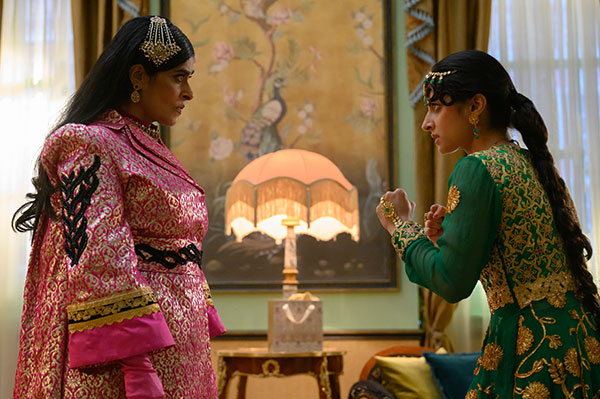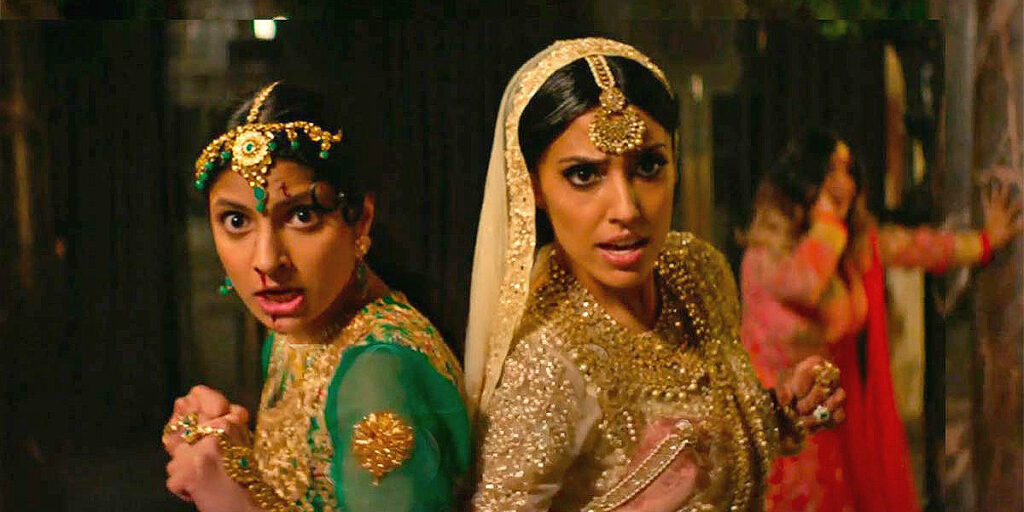Priya Kansara gives an incredible breakout performance in the unfortunately dull Polite Society, which puts the “when is too much too much?” notion to the test.
We’re past the point of wondering if audiences will eat up a maximalist picture, with films like Everything Everywhere All at Once and RRR earning universal acclaim and winning Academy Awards. The more elaborate a picture is, the better, because its hyperreal style ensures that the movie will always be original, creative, and fun. But you must know when “too much” can be…too much. If you continuously find ways to reinvent yourself by topping each bonkers sequence with an even more insane one, chances are your film won’t get annoying. If, at some point, you hit a wall and keep repeating the same thing over and over again (as is the case with Everything Everywhere All at Once’s ending), chances are you did too much in the first act, and you’re now scrambling to figure out what to salvage.
Polite Society, unfortunately, tests that notion: it’s already too much by the film’s first ten minutes, where it introduces us to the main protagonist, Ria Khan (Priya Kansara), who aspires to be a stuntwoman like her role model Eunice Huthart. A well-choreographed (but unimpressively edited) fight scene between Ria and Kovacs (Shona Babayemi) shows how the rest of the movie will operate: large text will appear on screen to signal a one-on-one fight, its main acts are divided into five chapters, and the editing zips way too fast for the audience to catch a breath.
Meanwhile, Ria’s parents (Shobu Kapoor & Jeff Mirza) want her to become a doctor and nudge her in that direction, forcing her sister, Lena (Ritu Arya), to drop out of art school. During an Eid soirée, Lena meets Salim (Akshay Khanna), and the two get engaged within weeks. However, Ria believes something is up with Salim, particularly regarding her mother, Raheela (Nimra Bucha), who seems to have a hidden agenda for why the wedding will take place.

Of course, her parents, friends, and sister don’t believe Ria, who will now take matters into her own hands to sabotage the wedding. The “sabotage” itself is pretty fun, and there’s an extremely funny sequence set in a gym where Ria and her friends attempt to steal Salim’s computer. It’s a great showcase for Kansara, the best part of the movie. Her comedic timing is impeccable but particularly hilarious in that sequence. She also gets to show her dancing and fighting skills during its climax. Writer/director Nida Manzoor flexes her cinematic knowledge by having Matrix Reloaded-lite fight sequences alongside an exuberant Bollywood dance number. It’s just a shame that everything around Kansara falls flat.
For a movie that dares to blend so many genres, it should be criminal for the action scenes to be edited the way they are. There’s barely a flow of movement – it’s all robotically stitched together without an ounce of legitimate flair or kineticism that would make a movie like this soar. Plenty of action scenes are edited so quickly, to fit into the film’s hyperactive tone that it loses any sense of momentum or emotional investment the audience can have. One moment, Raheela is about to kick Ria, magically transports herself elsewhere in the frame with one quick cut. There’s no sense of basic continuity in the action, which renders the suspension of disbelief slightly frustrating. If anything, the action style resembles the nonsensical hyperactivity of K.G.F: Chapter 1, where a cut happens every 0.5 seconds, disengaging you into the film much more quickly than anything else.
It also doesn’t help that the main antagonist is amazingly clichéd. No offense to Nimra Bucha, but she is two for two in playing underdeveloped villains. We’ve heard all of her lines before, and while her fighting skills are more impressive than in Ms. Marvel, it still feels plucked out of every action movie ever. Still, I’ll give credit where it’s due: at least she won’t go down without a fight, which makes her confrontation with Ria somewhat entertaining.
But it doesn’t take long before Polite Society gets exhausting. The breakneck pace works to an extent, but there’s so much Manzoor can do to keep the audience on edge before it becomes annoying and tiresome. The potential is there, and the acting talent is more than game for what’s on screen. However, the framing device of Polite Society feels like “too much,” especially when the film itself and the action sequences are this haphazardly edited.
Maximalist action should embrace cinema’s style and vivid power as a visual medium. The best maximalist movies will do that — RRR, John Wick: Chapter 4, Everything Everywhere All at Once, and Michael Bay’s Ambulance are recent examples of good maximalism. Polite Society, unfortunately, doesn’t fall in that category. Its intentions are more than noble, but the execution leaves little to be desired.
Polite Society is out now globally in theaters.

